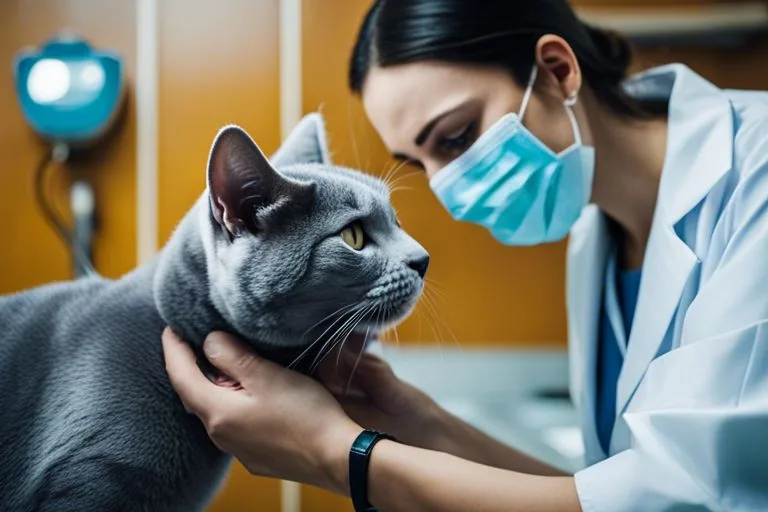Have you ever wondered if your beloved Russian Blue cat is more susceptible to gum disease? As a cat owner, it’s important to be aware of your pet’s dental health and any potential risks they may face. While all cats can develop gum disease, there are certain factors that may make Russian Blue cats more prone to this condition. In this article, we will explore the unique characteristics of Russian Blue cats that may increase their susceptibility to gum disease, as well as the importance of dental care for these beautiful felines.
Key Takeaways:
- Russian Blue cats may be more susceptible to gum disease due to their genetic predisposition to dental problems.
- In order to prevent gum disease in Russian Blue cats, it is important to prioritize regular dental care and preventive measures such as brushing their teeth and providing dental treats.
- Consulting with a veterinarian and scheduling routine dental check-ups can help prevent and treat gum disease in Russian Blue cats.
Characteristics of Russian Blue Cats
Clearly, Russian Blue cats are a unique and distinctive breed. If you want to learn more about the specific characteristics of this breed, you can check out this resource on Russian Blue cats.
Physical Traits
When it comes to the physical traits of Russian Blue cats, you’ll notice their striking silver-blue coat, which is plush and dense. Their eyes are a vivid green color, and their bodies are lean and muscular. Russian Blue cats are known for their elegant and graceful appearance, with a sleek and refined overall look.
Behavioral Traits
As for their behavioral traits, Russian Blue cats are known for being affectionate and loyal companions. They are typically reserved around strangers but form strong bonds with their human family members. They are also known for their intelligence and curiosity, often enjoying interactive toys and games. Russian Blue cats are generally quiet and gentle, making them a great addition to your household.
Feline Dental Diseases
Some cat breeds, such as the Russian Blue, are more prone to dental diseases like gum disease. As a Russian Blue cat owner, it’s essential to understand the common dental issues that can affect your feline friend and how to prevent them.
Overview of Gum Disease in Cats
Gum disease, also known as periodontal disease, is a common dental issue in cats. It is caused by the accumulation of plaque and tartar on the teeth, leading to inflammation of the gums and eventual destruction of the tooth’s supporting structures. If left untreated, gum disease can result in tooth loss and may even contribute to other health issues in your cat.
Contributing Factors to Feline Gum Disease
There are several factors that can contribute to gum disease in cats, including poor dental hygiene, genetics, and diet. If you don’t brush your cat’s teeth regularly, plaque and tartar can build up, increasing the risk of gum disease. Additionally, some cats may be genetically predisposed to dental issues, making them more susceptible to gum disease. A diet high in carbohydrates and low in dental-friendly nutrients can also impact your cat’s dental health. The accumulation of plaque and tartar on the teeth can lead to gum disease over time, so it’s essential to monitor your cat’s oral health closely. The good news is that with proper care and attention, you can help prevent and manage gum disease in your Russian Blue cat.
The Susceptibility of Russian Blue Cats to Gum Disease
For Russian Blue cats, like many other breeds, gum disease can be a common health issue. According to Hepper, Russian Blue cats are known to be susceptible to various health problems, including gum disease. In this section, we will explore the reasons why Russian Blue cats may be more prone to developing gum disease and what you can do to prevent it.
Genetic Predispositions
Russian Blue cats may be genetically predisposed to dental issues, including gum disease. This is due to their unique genetic makeup, which can make them more susceptible to certain health conditions. It is important to be aware of this genetic predisposition and take proactive measures to keep your Russian Blue’s oral health in check, including regular dental check-ups and proper oral hygiene.
Diet and Oral Hygiene Considerations
Furthermore, the diet and oral hygiene practices of your Russian Blue cat can significantly impact their susceptibility to gum disease. A diet high in sugar and carbohydrates can contribute to dental problems, while proper oral hygiene, such as regular teeth brushing and dental care, can help maintain your cat’s oral health. Paying attention to these considerations can make a significant difference in preventing gum disease in your Russian Blue.
By being aware of the genetic predispositions and understanding the importance of diet and oral hygiene for your Russian Blue cat, you can take proactive steps to ensure their oral health. Regular dental check-ups, a balanced diet, and proper oral hygiene can help prevent gum disease and keep your Russian Blue cat healthy and happy.
Prevention and Care
Keep your Russian Blue cat’s oral health in check by implementing preventive measures to avoid gum disease. With regular dental check-ups and cleaning, as well as home care strategies, you can help maintain good oral hygiene and prevent gum disease from developing.
Regular Dental Check-ups and Cleaning
It’s important to schedule regular dental check-ups for your Russian Blue cat with a veterinarian. They can perform a thorough examination of your cat’s teeth and gums, looking for any signs of gum disease or other dental issues. Professional dental cleanings can also help remove plaque and tartar buildup, which can contribute to gum disease. Your veterinarian can provide guidance on the frequency of dental cleanings, as well as any additional dental care your cat may need.
Home Care Strategies for Russian Blue Cats
In addition to regular veterinary check-ups, you can also implement home care strategies to help prevent gum disease in your Russian Blue cat. This includes brushing your cat’s teeth regularly with a pet-specific toothbrush and toothpaste. Additionally, providing dental treats or toys designed to promote oral health can help reduce plaque and tartar buildup. Introducing these home care strategies can significantly contribute to the overall oral health of your Russian Blue cat.
By implementing regular dental check-ups and cleaning, as well as home care strategies such as brushing your cat’s teeth and providing dental treats, you can help prevent gum disease in your Russian Blue cat. Monitoring your cat’s oral health and taking preventive measures will ensure that they maintain a healthy and happy smile.
Are Russian Blue Cats More Susceptible To Gum Disease?
Presently, there is no evidence to suggest that Russian Blue cats are more susceptible to gum disease than other breeds. However, it is important to remember that all cats, regardless of breed, can be prone to dental issues. It is crucial to maintain good dental hygiene for your cat, including regular teeth cleaning and professional dental check-ups. Additionally, providing your cat with dental-friendly toys and a diet that promotes dental health can help prevent gum disease. Keep an eye out for any signs of dental problems in your Russian Blue cat, such as bad breath, swollen gums, or difficulty eating, and consult with a veterinarian if you have any concerns. Ultimately, proper dental care and regular monitoring are key to ensuring your Russian Blue cat maintains a healthy mouth.
FAQ
Q: Are Russian Blue cats more susceptible to gum disease?
A: Russian Blue cats are not known to be more susceptible to gum disease than other breeds. However, proper dental care is essential for all cats to prevent gum disease.
Q: How can I prevent gum disease in my Russian Blue cat?
A: You can prevent gum disease in your Russian Blue cat by regularly brushing their teeth, providing them with dental treats or toys, and scheduling regular dental check-ups with your veterinarian.
Q: What are the signs of gum disease in Russian Blue cats?
A: Signs of gum disease in Russian Blue cats may include bad breath, swollen or bleeding gums, difficulty eating, or excessive drooling. If you notice any of these signs, it’s important to seek veterinary care.
Q: Can gum disease in Russian Blue cats lead to other health problems?
A: Yes, untreated gum disease in Russian Blue cats can lead to more serious health issues such as tooth loss, abscesses, and even systemic infections that can affect the heart, kidneys, and other organs.
Q: How often should I have my Russian Blue cat’s teeth checked by a veterinarian?
A: It is recommended to have your Russian Blue cat’s teeth checked by a veterinarian at least once a year. Your veterinarian can assess their dental health and provide professional cleanings if necessary.



